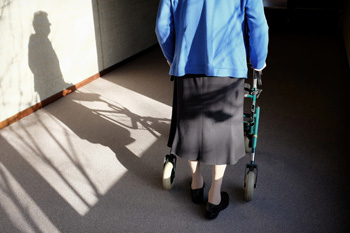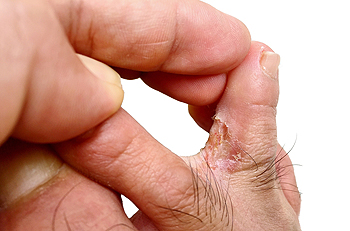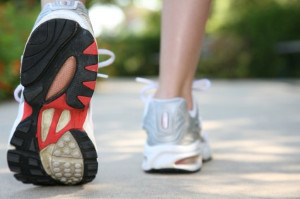Connect With Us
Blog
Items filtered by date: November 2019
Arthritis Can Cause Pain in the Feet and Ankles
Strategies That Help To Prevent Falling
 Research has indicated that it is beneficial to implement strategies that can be helpful in preventing falling. This is crucial as the aging process occurs, and may be beneficial in avoiding painful injuries. When gentle exercises are frequently performed, the body may become stronger, and falling may be prevented. Additionally, taking vitamin D on a daily basis may help to minimize a bone density deficiency. Other ways to prevent falling may include removing any loose carpeting in the living area, and installing grab bars in the toilet and shower area. Many elderly patients are aware of the importance of regularly checking their vision, which helps to determine how well objects are seen that may be in their way of walking. If you would like additional information about how falling can affect the feet, please speak with a podiatrist.
Research has indicated that it is beneficial to implement strategies that can be helpful in preventing falling. This is crucial as the aging process occurs, and may be beneficial in avoiding painful injuries. When gentle exercises are frequently performed, the body may become stronger, and falling may be prevented. Additionally, taking vitamin D on a daily basis may help to minimize a bone density deficiency. Other ways to prevent falling may include removing any loose carpeting in the living area, and installing grab bars in the toilet and shower area. Many elderly patients are aware of the importance of regularly checking their vision, which helps to determine how well objects are seen that may be in their way of walking. If you would like additional information about how falling can affect the feet, please speak with a podiatrist.
Preventing falls among the elderly is very important. If you are older and have fallen or fear that you are prone to falling, consult with Tanisha Richmond, DPM from Richmond Foot & Ankle, LLC. Our doctor will assess your condition and provide you with quality advice and care.
Every 11 seconds, an elderly American is being treated in an emergency room for a fall related injury. Falls are the leading cause of head and hip injuries for those 65 and older. Due to decreases in strength, balance, senses, and lack of awareness, elderly persons are very susceptible to falling. Thankfully, there are a number of things older persons can do to prevent falls.
How to Prevent Falls
Some effective methods that older persons can do to prevent falls include:
- Enrolling in strength and balance exercise program to increase balance and strength
- Periodically having your sight and hearing checked
- Discuss any medications you have with a doctor to see if it increases the risk of falling
- Clearing the house of falling hazards and installing devices like grab bars and railings
- Utilizing a walker or cane
- Wearing shoes that provide good support and cushioning
- Talking to family members about falling and increasing awareness
Falling can be a traumatic and embarrassing experience for elderly persons; this can make them less willing to leave the house, and less willing to talk to someone about their fears of falling. Doing such things, however, will increase the likelihood of tripping or losing one’s balance. Knowing the causes of falling and how to prevent them is the best way to mitigate the risk of serious injury.
If you have any questions, please feel free to contact our office located in Dayton, OH . We offer the newest diagnostic and treatment technologies for all your foot care needs.
Impacts of Rheumatoid Arthritis on the Feet
 Rheumatoid Arthritis, or RA for short, may develop when your immune system attacks your joint lining tissue, causing painful inflammation and stiffness. To help detect if this condition is affecting you, note the following symptoms: pain or stiffness in the toe joints, aching or soreness in the feet after regular activity such as walking or standing for long periods of time, and swelling in your toe joints or ankles. To help relieve these symptoms, it is advised to wear open-toed shoes, get regular sleep, quit smoking, reduce stress, and keep your joints warm. It is important to note that symptoms don’t always show up right away, which is why it is recommended that you see a podiatrist for a proper diagnosis and advised recovery regime.
Rheumatoid Arthritis, or RA for short, may develop when your immune system attacks your joint lining tissue, causing painful inflammation and stiffness. To help detect if this condition is affecting you, note the following symptoms: pain or stiffness in the toe joints, aching or soreness in the feet after regular activity such as walking or standing for long periods of time, and swelling in your toe joints or ankles. To help relieve these symptoms, it is advised to wear open-toed shoes, get regular sleep, quit smoking, reduce stress, and keep your joints warm. It is important to note that symptoms don’t always show up right away, which is why it is recommended that you see a podiatrist for a proper diagnosis and advised recovery regime.
Because RA affects more than just your joints, including the joints in your feet and ankles, it is important to seek early diagnosis from your podiatrist if you feel like the pain in your feet might be caused by RA. For more information, contact Tanisha Richmond, DPM of Richmond Foot & Ankle, LLC. Our doctor will assist you with all of your podiatric concerns.
What Is Rheumatoid Arthritis?
Rheumatoid Arthritis (RA) is an autoimmune disorder in which the body’s own immune system attacks the membranes surrounding the joints. Inflammation of the lining and eventually the destruction of the joint’s cartilage and bone occur, causing severe pain and immobility.
Rheumatoid Arthritis of the Feet
Although RA usually attacks multiple bones and joints throughout the entire body, almost 90 percent of cases result in pain in the foot or ankle area.
Symptoms
- Swelling and pain in the feet
- Stiffness in the feet
- Pain on the ball or sole of feet
- Joint shift and deformation
Diagnosis
Quick diagnosis of RA in the feet is important so that the podiatrist can treat the area effectively. Your doctor will ask you about your medical history, occupation, and lifestyle to determine the origin of the condition. Rheumatoid Factor tests help to determine if someone is affected by the disease.
If you have any questions please feel free to contact our office located in Dayton, OH . We offer the newest diagnostic and treatment technologies for all your foot and ankle needs.
Can Practicing Yoga Help to Prevent Running Injuries?
Research has indicated it is beneficial to perform specific stretching techniques that may be helpful in preventing running injuries. It is wise to choose running shoes that fit correctly, assuring the heel and toes feel comfortable. The joints, muscles, and tendons can remain flexible when yoga is routinely practiced, which may help to increase the enjoyment of running. Additionally, many runners practice strength training, this can keep the muscles strong which may add to endurance. Any tension that is present may be alleviated when a massage is performed, helping this to aid the body in feeling relaxed. If you are contemplating the sport of running, it is suggested that you speak to a podiatrist who can advise you on how to prevent running injuries.
All runners should take extra precaution when trying to avoid injury. If you have any concerns about your feet, contact Tanisha Richmond, DPM of Richmond Foot & Ankle, LLC. Our doctor will treat your foot and ankle needs.
How to Prevent Running Injuries
There are a lot of mistakes a runner can make prior to a workout that can induce injury. A lot of athletes tend to overstretch before running, instead of saving those workouts for a post-run routine. Deep lunges and hand-to-toe hamstring pulls should be performed after a workout instead of during a warmup. Another common mistake is jumping into an intense routine before your body is physically prepared for it. You should try to ease your way into long-distance running instead of forcing yourself to rush into it.
More Tips for Preventing Injury
- Incorporate Strength Training into Workouts - This will help improve the body’s overall athleticism
- Improve and Maintain Your Flexibility – Stretching everyday will help improve overall performance
- “Warm Up” Before Running and “Cool Down” Afterward – A warm up of 5-10 minutes helps get rid of lactic acid in the muscles and prevents delayed muscle soreness
- Cross-Training is Crucial
- Wear Proper Running Shoes
- Have a Formal Gait Analysis – Poor biomechanics can easily cause injury
If you have any questions, please feel free to contact our office located in Dayton, OH . We offer the newest diagnostic and treatment technologies for all your foot care needs.
Gout Pain Can Be Managed
How Do Cracked Heels Develop?
 Many patients find the skin on the heels may gradually become dry and cracked. Another name for deep cracks in the skin are known as heel fissures. This can occur as a result of wearing shoes that have an open back. These types of shoes can offer minimal support, and may place additional pressure on the heels. Additional reasons why this condition may develop can include pregnancy, obesity, and diabetes. Eating an imbalanced diet may contribute to cracked heels, and it may be beneficial to supplement with vitamins. Research has indicated it may be helpful to drink plenty of water in addition to using a good moisturizer. If you have developed cracked heels, it is suggested that you seek the advice of a podiatrist who can help you to find relief.
Many patients find the skin on the heels may gradually become dry and cracked. Another name for deep cracks in the skin are known as heel fissures. This can occur as a result of wearing shoes that have an open back. These types of shoes can offer minimal support, and may place additional pressure on the heels. Additional reasons why this condition may develop can include pregnancy, obesity, and diabetes. Eating an imbalanced diet may contribute to cracked heels, and it may be beneficial to supplement with vitamins. Research has indicated it may be helpful to drink plenty of water in addition to using a good moisturizer. If you have developed cracked heels, it is suggested that you seek the advice of a podiatrist who can help you to find relief.
Cracked heels are unsightly and can cause further damage to your shoes and feet. If you have any concerns, contact Tanisha Richmond, DPM from Richmond Foot & Ankle, LLC. Our doctor can provide the care you need to keep you pain-free and on your feet.
Cracked Heels
Cracked heels appear unappealing and can make it harder for you walk around in sandals. Aside from looking unpleasant, cracked heels can also tear stockings, socks, and wear out your shoes. There are several methods to help restore a cracked heel and prevent further damage.
How Do You Get Them?
Dry skin is the number one culprit in creating cracked heels. Many athletes, walkers, joggers, and even swimmers suffer from cracked heels. Age and skin oil production play a role to getting cracked heels as well.
Promote Healing
Over the counter medicines can help, especially for those that need instant relief or who suffer from chronic dry feet.
Wear Socks – Wearing socks with medicated creams helps lock in moisture.
Moisturizers – Applying both day and night will help alleviate dryness which causes cracking.
Pumice Stones – These exfoliate and remove dead skin, which allows for smoother moisturizer application and better absorption into the skin.
Change in Diet
Eating healthy with a well-balanced diet will give the skin a fresh and radiant look. Your body responds to the kinds of food you ingest. Omega-3 fatty acids and zinc supplements can also revitalize skin tissue.
Most importantly, seek professional help if unsure how to proceed in treating cracked heels. A podiatrist will help you with any questions or information needed.
If you have any questions, please feel free to contact our office located in Dayton, OH . We offer the newest diagnostic and treatment technologies for all your foot care needs.
What is a Corn?
 A corn can form on different parts of the foot as a result of excess friction. It is defined as a hard, thickened area, and will typically cause severe pain and discomfort. If the shoes that are worn do not fit properly, a corn may form on the inside of the pinky toe. Relief may be found if a pad is worn over the affected area. Additionally, it may help to soak the affected foot in warm water, as this may aid in softening the corn. Afterward, a pumice stone can be used in gently filing the corn to remove any dead skin. When toenails are properly trimmed, pressure may be avoided from the nail touching the skin, and this may help to prevent corns from developing. If you are afflicted with corns, it is suggested that you seek the counsel of a podiatrist who can assist you in choosing the proper treatment.
A corn can form on different parts of the foot as a result of excess friction. It is defined as a hard, thickened area, and will typically cause severe pain and discomfort. If the shoes that are worn do not fit properly, a corn may form on the inside of the pinky toe. Relief may be found if a pad is worn over the affected area. Additionally, it may help to soak the affected foot in warm water, as this may aid in softening the corn. Afterward, a pumice stone can be used in gently filing the corn to remove any dead skin. When toenails are properly trimmed, pressure may be avoided from the nail touching the skin, and this may help to prevent corns from developing. If you are afflicted with corns, it is suggested that you seek the counsel of a podiatrist who can assist you in choosing the proper treatment.
Corns can make walking very painful and should be treated immediately. If you have questions regarding your feet and ankles, contact Tanisha Richmond, DPM of Richmond Foot & Ankle, LLC. Our doctor will treat your foot and ankle needs.
Corns: What Are They? And How Do You Get Rid of Them?
Corns are thickened areas on the skin that can become painful. They are caused by excessive pressure and friction on the skin. Corns press into the deeper layers of the skin and are usually round in shape.
Ways to Prevent Corns
There are many ways to get rid of painful corns such as:
- Wearing properly fitting shoes that have been measured by a professional
- Wearing shoes that are not sharply pointed or have high heels
- Wearing only shoes that offer support
Treating Corns
Although most corns slowly disappear when the friction or pressure stops, this isn’t always the case. Consult with your podiatrist to determine the best treatment option for your case of corns.
If you have any questions please feel free to contact our office located in Dayton, OH . We offer the newest diagnostic and treatment technologies for all your foot and ankle needs.
Blog Archives
- April 2025
- March 2025
- February 2025
- January 2025
- December 2024
- November 2024
- October 2024
- September 2024
- August 2024
- July 2024
- June 2024
- May 2024
- April 2024
- March 2024
- February 2024
- January 2024
- December 2023
- November 2023
- October 2023
- September 2023
- August 2023
- July 2023
- June 2023
- May 2023
- April 2023
- March 2023
- February 2023
- January 2023
- December 2022
- November 2022
- October 2022
- September 2022
- August 2022
- July 2022
- June 2022
- May 2022
- April 2022
- March 2022
- February 2022
- January 2022
- December 2021
- November 2021
- October 2021
- September 2021
- August 2021
- July 2021
- June 2021
- May 2021
- April 2021
- March 2021
- February 2021
- January 2021
- December 2020
- November 2020
- October 2020
- September 2020
- August 2020
- July 2020
- June 2020
- May 2020
- April 2020
- March 2020
- February 2020
- January 2020
- December 2019
- November 2019
- October 2019
- September 2019
- August 2019
- July 2019
- June 2019
- May 2019
- April 2019
- March 2019
- February 2019
- January 2019
- December 2018
- November 2018


